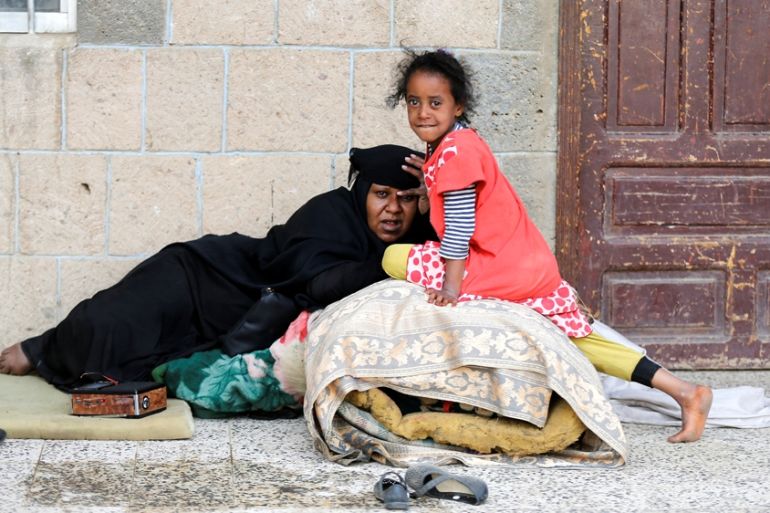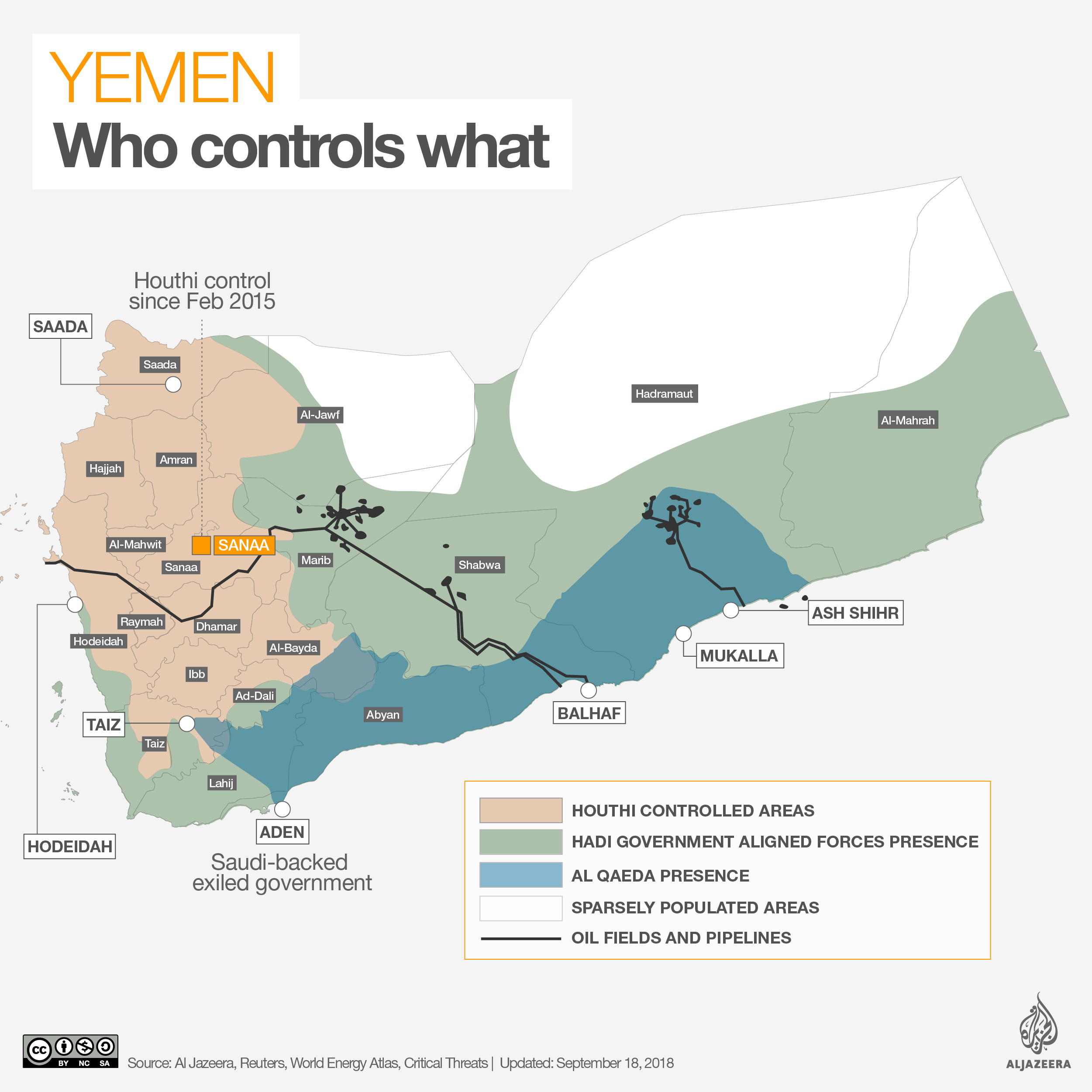Inside the Yemeni school where childhood doesn’t exist
Several schools in the capital have abandoned classes, serving as shelters for thousands of displaced families instead.

Nine-year-old Ahmad spends most of his time on his own, kicking away at bits of dirt and trying to get a deflated football to rebound off an old brick wall just metres away from the classroom where he sleeps.
For the last six months, this has been his daily routine. It helps the long days go faster, he says.
Keep reading
list of 4 itemsUS sanctions shipping firm accused of links to Iran, Yemen’s Houthis
Vessel struck in Red Sea as Houthis promise attacks on more shipping lanes
What we know about deadly Houthi attack on cargo ship
It also reminds him of some of the happier moments of his life.
Six months ago, Ahmad would spend most of his lunch breaks running around with his best friend Hesham, playing football in his school playground in the port city of Hodeidah.
But since fighting erupted in his neighbourhood last June, Ahmad’s found himself enduring a rather different school experience.
After fleeing to Sanaa with his parents and younger sister, the family now sleeps on thin mattresses on the cold floor of Muhammad Abdullah Saleh school in the capital. There is little food here and internally displaced people (IDPs) have to bathe using buckets filled with grey water.
Hodeidah, a large city on Yemen’s Red Sea coast, has been the latest battleground between the Houthis and the Saudi-UAE coalition battling for control of the country.
|
|
More than 445,000 Yemenis have fled the city since the summer.
Without toys or friends, Ahmad’s parents say his life has been upended, with the young boy losing a massive chunk of his childhood each day to Yemen’s four-year-war.
“There’s no internet, no computers, no TV,” Ahmad told Al Jazeera. “Everyday it’s the same. It’s very boring.”
His father says he’s tried to get him to make new friends with some of the other IDPs. But according to his mother, the sound of falling bombs and gnawing poverty have taken a heavy toll on his emotional well-being.
Each day he struggles to recreate the life he once had in Hodeidah, she said.
“His behaviour has changed a lot,” she added. “The way he now yells at his sister, no child of this age should be talking to their family [members] like that.”
![More than 445,000 Yemenis have fled Hodeidah since the start of June, with thousands of IDPs heading to the relative safety of the capital Sanaa [Khaled Abdullah/Reuters]](/wp-content/uploads/2018/09/a35972992d764b019128330fa85c7e18_18.jpeg)
The smell of mould and faeces
Just metres away from the classroom they now call ‘home’, plastic sheets are used by some of the recent IDPs to keep out the chilly weather.
“The situation [in Hodeidah] traumatised my children,” said Abdulla Hasn, who was among the first Yemenis to flee Hodeidah when pro-government forces, backed by the Saudi-UAE coalition, began advancing on the city.
Living in the small classroom with 16 of his relatives, Hasn said: “They [my children] were crying, asking me to take them to another safe place. Then I moved with them to Sanaa.”
At the time, Hasn was not able to escape due to his finances. Not earning enough to cover the transportation costs, the group could only afford to leave when a “well-off” businessman loaned them 50,000 Yemeni riyals ($100) for the journey.
“I got the money and immediately left for Sanaa along with my wife, seven children, my sister and her seven children,” Hasn said.
After six gruelling hours, they finally reached the capital, a city reeling from more than four years of devastating coalition air strikes: Debris from bombed houses and shops lined the streets and poverty was widespread.
With camps already inundated with Yemeni IDPs, schools were the only option left to seek shelter in, he said.
Blankets and dirty plates lay on the floors and more than a dozen people were crammed into some of the classrooms.
The smell of mould and faeces permeated through the hallways, some of the IDPs said, and the bathrooms are not equipped with showers.
“We survive on rice and bread,” said Hasn. “I don’t have a single riyal [to my name]”.
![Thousands of IDPs have taken refuge at schools across the capital [Hani Mohammed/Associated Press]](/wp-content/uploads/2018/09/7c640edbe92741e6b14ed72d8f5d7828_18.jpeg)
‘Real tragedy’
With the humanitarian catastrophe in Yemen already referred to as one of the worst in the world, the intense battles raging in Hodeidah meant that Hasn had no option but to remain in Sanaa, which has been under the control of Houthi rebels since 2014.
The Yemeni government intensified its efforts to retake Hodeidah in order to clear a path to Sanaa, the capture of which it believes will end the war.
Once home to around 600,000 people, Hodeidah was Yemen’s most important city because of the port, through which 80 percent of the country’s commercial goods, aid and fuel flowed.
But since it was captured by the Houthis during their lightning offensive, the Red Sea city saw its fortunes shift from Yemen’s agro-industrial capital to a fierce battleground.
|
|
Most of the school’s residents said that, had they known what lay in store for them, they would have probably remained in Hodeidah.
Ghamdan Abu Ali, a journalist and IDP from Hodeidah, said the dire situation of IDPs was another hidden “tragedy” of the war.
He said the only effective way to help those languishing in makeshift camps was to “stop the Hodeidah offensive so that people can return to their houses and live with dignity”.
“Residents from Hodeidah fled to many provinces including Sanaa, Dhamar and Hajjah. They abandoned everything in their city. They are now undergoing harsh living conditions,” said Ali.
He added that rent had soared since IDPs took shelter in Sanaa, with landlords capitalising on the chaos.
“An apartment which could have been rented out for $60 a month is now going in the region of $100,” he said.
Saba Al-Mualemi, a communications officer at the International Organization for Migration in Yemen (IMO), said recent arrivals “received aid including food commodities, mattresses, blankets and cleaning items”.
But for the hundreds of thousands scattered across the capital receiving meagre food rations and medicine, whatever aid was being delivered did little to mitigate their suffering.
Ahmad’s father said he hoped the next round of peace talks could offer a brief respite for his children.
But with fighting in Hodeidah showing no signs of abating, he feared the ongoing suffering could eat away at the last bit of resilience and optimism in his children.
